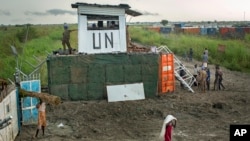The ongoing conflict in South Sudan is straining relations between the government and international organizations trying to assist millions in need. There are attempts to rein in the NGOs and agencies that are pushing the boundaries and testing a government trying to take control of a country in crisis.
In mid-September, South Sudan’s labor minister warned all foreign workers in the country to give up their positions by October 15 and open up jobs to locals.
The order was interpreted as a kind of mass expulsion of foreigners who, through business interests, international aid agencies and diplomatic missions, have been propping up the South Sudan government and providing the bulk of basic services in areas like health and education since before the country declared independence in 2011.
After a backlash from the international community, the government quickly retracted the order, which Paul Kumbo, South Sudan’s director general for information, says was misinterpreted in the first place.
“Some NGOs have taken it wrongly and then they try to blame the government that they are trying to chase the foreigners. This is not true," said Kumbo.
He said relations with foreign workers and NGOs in particular are strong, but stands by the opinion that more jobs should be opened up to locals.
"In any country there are certain positions, like a receptionist, do you need to bring somebody from America to become a receptionist in your office? What about the locals? The nationals? This is the type of work that can be given to the locals," he said.
Foreigners in Juba never really thought the order would be enacted as it was initially stated, but say it does reflect a feeling of growing insecurity from the government.
As one Western diplomat put it, “What they want at the end of the day is not to expel you, but to control you.”
To that end, South Sudan’s national assembly has been considering a so-called NGO bill that would put greater oversight on international organizations, legislation which some observers say could become oppressive.
Tensions have increased in the last 10 months as the government fights an armed rebel opposition that has taken control of key areas of the country.
Relations hit a low point in March when South Sudanese authorities discovered weapons in a United Nations convoy heading to Unity state - an area with a heavy rebel presence as well as United Nations peacekeeping forces.
The U.N., which is not authorized to ship weapons by road, later apologized.
Nhial Tiitmamer, a researcher at South Sudan’s Sudd Institute, says a communication breakdown during incidents like these is partly to blame for the strain in relations.
“In general, the situation was made worse because the working relationship was not transparent. The way the NGO’s were operating was not transparent to the government. The government wanted to be consulted on a number of things, but the NGOs were not in a position to do that," said Tiitmamer.
A major issue of contention is that aid agencies say they need to operate in areas that are under rebel control, conflict zones where displacement is high and humanitarian needs are the most pressing.
U.N. Humanitarian Coordinator Toby Lanzer says relations with the government at this point are the worst he has seen.
“I’ve been here now for over two years and I haven’t seen the relationship between the government and international institutions or even embassies or non-governmental organizations be as challenging as it has over the past few months," said Lanzer.
Noting that the government is under immense pressure as it fights off the rebellion, Lanzer says it can be “unsettling, to say the least” to see NGOs operating throughout the country, particularly in areas under opposition control.
“The deeper issue here is how do you maintain a constructive relationship in situations of internal conflict when you need to be working with all authorities, wherever they are, whether they are part of the government per se or an authority which has established itself where the government is no longer present," he said.
Since the conflict began 10 months ago, some 10,000 people have been killed and more than one-and-a-half million have been displaced, many of them taking refuge at U.N. camps.
The international aid community's response has been to increase staff and ramp up operations in the hardest hit places.







